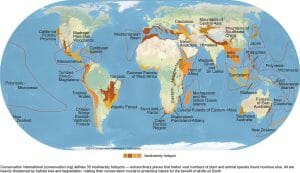Conservation Biology Definition
Conservation biology is a discipline that focuses on protecting and restoring the Earth’s biodiversity. It is a mission- or crisis-oriented science, where quick action is needed and failure can have devastating effects. Conservation biologists are concerned with understanding how life is distributed on the planet, what the threats to life are, and what can be done to eliminate the threats and restore the health and diversity of an ecosystem. Identifying and helping endangered species and preventing accelerated extinction rates are major duties of conservation biologists.
Biodiversity
Biological diversity, or biodiversity, refers to the variety of life found in an area. Biodiversity isn’t only about species; the term also includes genetic diversity and ecosystem diversity. Earth has an estimated 10 million species (excluding bacteria), but only about 2 million have been discovered and given scientific names. Biodiversity is important because an increase in the rate of species extinction can cause whole ecosystems to collapse. This will negatively impact human welfare and increase the cost of maintaining food production, clean water and air and human health.
Biodiversity Hot Spots
Because species are not evenly distributed around the Earth, there are several places that have many distinct species and/or species that not are found anywhere else on the planet (these are called endemic species). If a geographic area has at least 1,500 endemic vascular plants and 30% or less of its original vegetation, it qualifies as a biodiversity hot spot. Currently, 35 regions have been identified as hot spots. Together, they represent only 2.3% of the Earth’s surface, but they are home to more than 50% of the world’s endemic plant species and nearly 43% of the endemic mammal, bird, reptile and amphibian species.
Most tropical regions are hot spots due to the vast numbers of species in the rainforests and coral reefs. The Amazon River Basin, Madagascar, the Caribbean Islands, Western India, Southeast Asia and Central America are some of the tropical biodiversity hot spots. Some non-tropical hot spots include New Zealand, Western Australia, South Africa, the Mediterranean Basin, Central China, Central Chile and Eastern Europe. Hotspots found in the United States include the Pacific Coast, California and Hawaii.

The image above shows the biodiversity hots spots in the world.
Major Threats to Biodiversity
There are several current threats to biodiversity, and all of them are due to the actions of humans. The major ones are:
- Climate Change
- Habitat Destruction
- Overharvesting
- Invasive Species
- Poaching
- Pollution
- Deforestation
- Overgrazing
- Mining
Endangered Species
The Endangered Species Act was passed by the US Congress in 1973 and is run by the US Fish and Wildlife Service. It covers all plants and animals, except insects considered pests. Under the Act, species are categorized as threatened or endangered. Threatened means a species is “likely to become endangered within the foreseeable future.” Endangered means a species is “in danger of extinction throughout all or a significant portion of its range.” According to the World Wildlife Fund, the most critically endangered wildlife species are:
- Amur Leopard
- Black Rhino
- Bornean Orangutan
- Cross River Gorilla
- Eastern Lowland Gorilla
- Hawksbill Turtle
- Javan Rhino
- Malayan Tiger
- Mountain Gorilla
- Saola (forest-dwelling bovine)
- South China Tiger
- Sumatran Elephant
- Sumatran Orangutan
- Sumatran Rhino
- Sumatran Tiger
- Vaquita (a porpoise)
- Western Lowland Gorilla
- Yangtze Finless Porpoise
Quiz
1. Conservation biology _________________.
A. is concerned only about plant species.
B. works to create as many new species as possible.
C. is not practiced in the United States.
D. works to protect and restore the world’s biodiversity.
2. Why is biodiversity important?
A. Because environmental organizations say so.
B. Because increased extinction rates can cause ecosystems to collapse.
C. Because there should be no species that become extinct.
D. It isn’t important because endemic species live on only 2.3% of the earth’s surface.
3. Which of the following choices is NOT a current threat to biodiversity?
A. Big oceans.
B. Climate change.
C. Poaching.
D. Habitat destruction.
References
- “Conservation biology FAQs.” (2017, May 10). Retrieved from https://conbio.org/professional-development/education-programs/conservation-biology-faq.
- “Endangered Species Act.” (2017, May 10). Retrieved from https://www.fws.gov/endangered/laws-policies/.
- “Hotspots.” (2017, May 10). Retrieved from http://www.conservation.org/How/Pages/Hotspots.aspx.
- Pimm, S. (2017, March 31). Conservation. In Encyclopedia Britannica online. Retrieved from https://www.britannica.com/science/conservation-ecology.
- Pimm, S. (2017, February 10). Biodiversity. In Encyclopedia Britannica online. Retrieved from https://www.britannica.com/science/biodiversity.
- “Species directory.” (2017, May 10). Retrieved from https://www.worldwildlife.org/species/directory.
- “Threats to biodiversity.” (2017, May 10). Retrieved from http://wwf.panda.org/what_we_do/where_we_work/altai_sayan_mountain/altaisayan_threats/.
- “Threats to biodiversity and ecosystems.” (2017, May 10). Retrieved from http://www.chgeharvard.org/topic/threats-biodiversity-and-ecosystems.
Conservation Biology
No comments:
Post a Comment